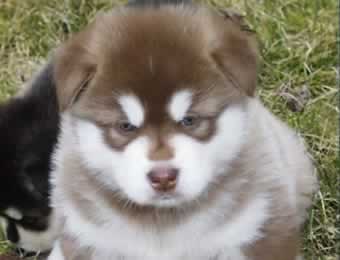Source(google.com.pk)
Cute Puppies Pictures Biography
Even though he may look grown up, the stages of puppy development last from birth to a year or even two before he's considered an adult dog. The greatest puppy development changes happen from birth to twelve weeks of age. But from twelve weeks on, your fur-kid still has lots of growing up .
The juvenile puppy period generally begins at age ten weeks, and lasts until puberty and the onset of sexual maturity. It is during this period that puppies begin to learn the consequences of behavior, and determine what is most appropriate to certain circumstances.
Puppies at this age have boundless curiosity, exasperating stubbornness, and enthusiastic affection. Expect your puppy to get into everything, and you won't be disappointed. This is an ideal time to begin training.
Nearly every waking moment is spent in play, which is not only great fun for the babies, but is great practice for canine life. Puppies learn how to do important dog activities like chasing and running, pawing, biting and fighting. Social skills and canine etiquette are learned by interaction with littermates and Mom. Puppies learn to inhibit their bite when they are bitten by each other, and learn canine language. Through play, they practice dominant and submissive postures, and prepare for life in the world.Puppies test their boundaries during this period that lasts anywhere from a few days to several weeks. These dogs challenge owners to see who calls the shots, seem to “forget” any training they’ve learned, and act like rebellious teenagers.
Some of this has to do with teething. Pups lose baby teeth starting about three months of age. There can be discomfort as the permanent teeth erupt and puppies tend to chew more on anything and everything to relieve the pain.
Delinquent behavior also may be influenced by hormones. Unlike many other species, a male puppy’s testosterone level from age four-to-ten months may be up to five times higher than an adult dog’s. That’s so the adult canines recognizes he’s a juvenile and needs “schooling” in the ways of dogs—they make sure to knock him down a peg and teach manners before he gets too big for his furry britches.Pups grow so quickly during this period you may notice changes every single day. Not only may your pup test and challenge you, this is the time frame puppies also figure out where they stand with other pets in the group. Some squabbling and play fighting is expected. It’s a dog rule that older animals teach the pup limits, which is normal and usually sounds more scary than it is.
In fact, an un-neutered male puppy's testosterone level increases at around 4 to 5 months of age. This is one way adult dogs recognize that even big puppies are still babies and they they must be taught proper dog etiquette.
Puppies can also sometimes experience another fear phase during this period. It may last up to a month, and their maybe more than one especially in large breed dogs. This is normal and nothing to worry about. It tends to correspond with growth spurts, and you may notice some “flaky” behavior or unwarranted aggression, become protective of toys or territory. Just ensure you don’t reward the fearful behavior with more attention, and know how to talk to puppies and not use baby talk. It’s best to ignore the fear rather than risk rewarding it. Build confidence through training and the pup should transition out of it with no further problems.Most of your pup’s growth in height finishes by this period but he may continue to fill out and gain muscle mass and body weight. Puppy coat starts to be replaced by the adult coat.
While the baby may still be emotionally immature, during this period the boy pups begin to leg-lift and mark with urine. The testosterone level in male puppies increases to 5-7 times higher than in an adult dog by age 10 months, and then gradually falls to a normal adult level by about 18 months of age. This helps signal the senior male dogs that the youngster must be put in his place so you may notice more adult-pup squabbles during this period. Girl pups may go into heat (estrus) as early as five to six months, and boys begin to be interested in sex during this period.
Puppies at this age seem to explode with high energy and will do well with structured play and exercise. Training and continued socialization is vital to ensure your youngster knows how to behave politely with other dogs, other animals like cats, and other people including children and strangers of all sizes, ages, and looks.
Social Maturity: Between One and Two Years.

.jpg)







Cute Puppies Pictures Biography
Even though he may look grown up, the stages of puppy development last from birth to a year or even two before he's considered an adult dog. The greatest puppy development changes happen from birth to twelve weeks of age. But from twelve weeks on, your fur-kid still has lots of growing up .
The juvenile puppy period generally begins at age ten weeks, and lasts until puberty and the onset of sexual maturity. It is during this period that puppies begin to learn the consequences of behavior, and determine what is most appropriate to certain circumstances.
Puppies at this age have boundless curiosity, exasperating stubbornness, and enthusiastic affection. Expect your puppy to get into everything, and you won't be disappointed. This is an ideal time to begin training.
Nearly every waking moment is spent in play, which is not only great fun for the babies, but is great practice for canine life. Puppies learn how to do important dog activities like chasing and running, pawing, biting and fighting. Social skills and canine etiquette are learned by interaction with littermates and Mom. Puppies learn to inhibit their bite when they are bitten by each other, and learn canine language. Through play, they practice dominant and submissive postures, and prepare for life in the world.Puppies test their boundaries during this period that lasts anywhere from a few days to several weeks. These dogs challenge owners to see who calls the shots, seem to “forget” any training they’ve learned, and act like rebellious teenagers.
Some of this has to do with teething. Pups lose baby teeth starting about three months of age. There can be discomfort as the permanent teeth erupt and puppies tend to chew more on anything and everything to relieve the pain.
Delinquent behavior also may be influenced by hormones. Unlike many other species, a male puppy’s testosterone level from age four-to-ten months may be up to five times higher than an adult dog’s. That’s so the adult canines recognizes he’s a juvenile and needs “schooling” in the ways of dogs—they make sure to knock him down a peg and teach manners before he gets too big for his furry britches.Pups grow so quickly during this period you may notice changes every single day. Not only may your pup test and challenge you, this is the time frame puppies also figure out where they stand with other pets in the group. Some squabbling and play fighting is expected. It’s a dog rule that older animals teach the pup limits, which is normal and usually sounds more scary than it is.
In fact, an un-neutered male puppy's testosterone level increases at around 4 to 5 months of age. This is one way adult dogs recognize that even big puppies are still babies and they they must be taught proper dog etiquette.
Puppies can also sometimes experience another fear phase during this period. It may last up to a month, and their maybe more than one especially in large breed dogs. This is normal and nothing to worry about. It tends to correspond with growth spurts, and you may notice some “flaky” behavior or unwarranted aggression, become protective of toys or territory. Just ensure you don’t reward the fearful behavior with more attention, and know how to talk to puppies and not use baby talk. It’s best to ignore the fear rather than risk rewarding it. Build confidence through training and the pup should transition out of it with no further problems.Most of your pup’s growth in height finishes by this period but he may continue to fill out and gain muscle mass and body weight. Puppy coat starts to be replaced by the adult coat.
While the baby may still be emotionally immature, during this period the boy pups begin to leg-lift and mark with urine. The testosterone level in male puppies increases to 5-7 times higher than in an adult dog by age 10 months, and then gradually falls to a normal adult level by about 18 months of age. This helps signal the senior male dogs that the youngster must be put in his place so you may notice more adult-pup squabbles during this period. Girl pups may go into heat (estrus) as early as five to six months, and boys begin to be interested in sex during this period.
Puppies at this age seem to explode with high energy and will do well with structured play and exercise. Training and continued socialization is vital to ensure your youngster knows how to behave politely with other dogs, other animals like cats, and other people including children and strangers of all sizes, ages, and looks.
Social Maturity: Between One and Two Years.
Cute Puppies Pictures Biography


Cute Puppies Pictures Biography

Cute Puppies Pictures Biography
.jpg)
Cute Puppies Pictures Biography

Cute Puppies Pictures Biography

Cute Puppies Pictures Biography

Cute Puppies Pictures Biography

Cute Puppies Pictures Biography

Cute Puppies Pictures Biography
Cute Puppies Pictures Biography

Cute Puppies Pictures Biography
No comments:
Post a Comment